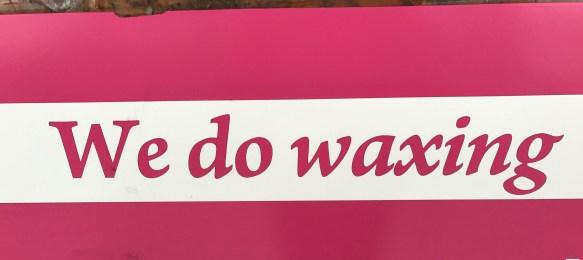English can’t do without “do,” a small but important verb. All by itself, “do” means “perform, act, or achieve” or “to be suitable or acceptable.” With another verb, “do” creates questions (“Do you like my new sofa?”), emphasis (“I do like it!”) or negation (“I do not hate the color.”) And then there’s “do” in the world of signs, where it shows up in odd or unnecessary places:

Why not “we repair” all those things? The only way this sign makes sense to me is if it is a response to customers complaining that the shop sells all that stuff and then leaves them on their own to figure out why the audio is supersonic and the video invisible. “You should fix these things,” I hear imaginary enraged clients shouting. In this scenario, “we do repair” is an attempt to shut down accusations.
And then there’s this sign:

Okay, “waxing” is a gerund here, a verb-noun hybrid (the Prius of the grammar world). With “waxing” as a gerund, the verb “do” technically makes sense, because “waxing” is a direct object. This usage still sounds strange to me, though. Yet “we wax” sounds odd also. To me, “we do waxing” comes across as a boast about some sort of mind-altering, illegal substance: “Cocaine is so 1980s! We do waxing at parties!” Forget about the sign for a minute. Isn’t the whole concept of waxing weird? Can’t people just shave or stay hairy? But I digress. “We do waxing” should probably be “we offer waxing” or “hair-removal via wax offered here.”
One more:

This sign makes sense, because “massage” is a noun in this sentence (which even has a period! be still my beating, grammatical heart!). Even so, it’s part of the trend that pushes the main action into the direct-object role and inserts an unnecessary verb. I’d rather see something like “we massage backs.”
A final comment: Why “we”? If the store is advertising something, shouldn’t you assume that the employees aren’t sending you to “they” — the repair, waxing, or massage emporium down the block? “We do” want to know, so if you have any theories, post them. And do me a favor: Don’t “do” unless you have to.
























